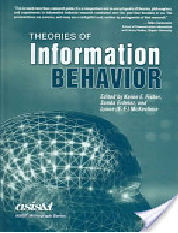
Arquivo para a ‘on-line libraries sharing’ Categoria
All books digitalized in Norway
The news worried the publishing market, but Norway aims by 2020 to provide all the  works that are available in the country , and made an audacious plan to the Norway National Library.
works that are available in the country , and made an audacious plan to the Norway National Library.
Also the books that are in other languages will be scanned, and the national control can be done through the IP (Internet Protocol on the computer) that is on your computer , this means that if you are in Norway can access the scanned books there and download, even though they have copyrights.
In other countries for selective access, i.e. e-books that are already free to download, can be accessed by ebooksgo.org page.
.
There are already cases of mass digitization in the UK and Finland , but Norway did something extra to make agreements with many publishers to allow any person with an IP address in Norway accessing a copyrighted material .
The library has equipment for scanning and analyzing text structure of the books . It will also include the addition of metadata and storing files in a database for easy retrieval , according to The Verge site .
Myths MOOCS discussed
In last Thursday (06/12) of more than 200 academic institutions from around the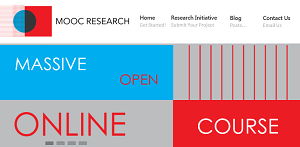 world met at a conference organized by the University of Texas at Arlington to hear the preliminary results on the MOOC Research Initiative, a program funded by the grant Bill and Melinda Gates Foundation and administered by Athabasca University in Canada .
world met at a conference organized by the University of Texas at Arlington to hear the preliminary results on the MOOC Research Initiative, a program funded by the grant Bill and Melinda Gates Foundation and administered by Athabasca University in Canada .
Several institutions received $ 10 to $ 25 thousand to examine how MOOCS (Education Massive Online) can modify the higher education and the results will be in the next issue of the International Review of Research in Open and Distance Learning as anticipates Inside Highred site .
The research presented on Thursday was perhaps best summarized by research Conducted by the University of Pennsylvania Graduate School of Education, Which Analyzed the study habits of 1 million students across 16 Coursera courses between June of 2012 and 2013.A research presented can be summarized with the work done by the University of Pennsylvania Graduate School of Education , which examined the study habits than 1 million students in 16 courses Coursera , between June 2012 and 2013 .
“Emerging data … show that online courses Massive Open ( MOOCs ) have relatively few active users, and that ‘ engagement ‘ user drops dramatically , especially after the first two weeks of a course , and that few users clearly persist until the end, ” can be read in a study summary .
This drops the myth that these courses would reach a few thousand students .
.
But other expectations are maintained , the cost of production MOOC . that can reach hundreds of thousands of dollars to create ” classes” of MOOC that are consumed and produced by institutions MOOC create two groups of problems , the first is not wanting to seem elitist , while the second is to generate content rejected even by own faculty members .
Christopher Brooks , a researcher at the University of Michigan School of Information said ” maybe this seems obvious ,” he said “A lot of things seem obvious in retrospect,” but the main problem is not even funding .
“How do we make this incredible thing and get our ideas from everyone and not go bankrupt ? This is the challenge . ” This is the challenge.” Said Akiba Covitz , senior vice president of strategic relations for Academic Partnerships , referring to MIT and Harvard .
Book about Brazilian scientific journals in health
Is available online free book: Journals on Health Sciences : Visibility , form and content, published by the School of Public Health and organized by me and researchers : Vania Maria B. Funaro de Oliveira , Lucia M. S. V. Costa Ramos and Rosane Taruhn and prefaced by Dr. Flavio Fava de Moraes .
School of Public Health and organized by me and researchers : Vania Maria B. Funaro de Oliveira , Lucia M. S. V. Costa Ramos and Rosane Taruhn and prefaced by Dr. Flavio Fava de Moraes .
In the presentation Prof . Dr. Flávio Fava de Moraes , Rector of the USP (São Paulo University (1993-1970) and former director of FAPESP (São Paulo Research Foudation) (1986-1993) , states that ” The book does not address the issue of the Journals only as a goal of disseminating results for an interested community . ‘s more, it considers its theoretical , conceptual , methodological , comparative , modern and spotless pedagogically , which could only be obtained by aggregating people here from proven skills in selected thematic ” .
Clarify in my presentation that the adoption of this form means : ” in the case of scientific … the inclusion of readers and consumers of content in a process that allows access to the ‘ distributed capital ‘ , i. e. , Web content , expanding and facilitating the process of information dissemination “.
In the first chapter the authors analyze where magazines , national and foreign researchers publish some projects funded by FAPESP , selected criteria , the Virtual Library of the Center for Information and Documentation of FAPESP .
The second chapter analyzes the Brazilian Public Health Journals : editing aspects , form and content , the authors , members of the Research Group on Science Communication in Public Health from CNPq , making a thorough analysis of 22 national titles.
The third chapter covers the Brazilian journals in nutrition : shape and theme brings an important contribution to an area still considered in its initial Brazilian scenario in the Nutrition.
The fourth chapter brings s Brazilian journals of Dentistry and its channels of dissemination of scientific research, is the state of the art of Brazilian scientific journals of dentistry in relation to their evolution over the years linked to quality, indexing bases data and the international visibility.
.
The fifth chapter , the authors bring Journals in Nursing in Latin America and the Caribbean reveals in his introduction , the professional in the field , with generalist, humanist, critical and reflective qualified to practice the profession , based on scientific and intellectual rigor and follow ethical principles .
Just consult the Library BVS School of Public Health School at the link provided
A “cloud” of books
An entrepreneur’s of Gol, brazilian air enterprise, Jonas Suassuna, which has books in one of his passions, beloved nephew of popular northest brazilian writer Ariano Suassuna, is responsible for the Cloud Books, a project in partnership with mobile operator Vivo, for providing educational content without downloading.
The entrepreneur who confesses to a “nonconformity” lack of access to books in public schools, especially in remote regions within the country, to seven years proposed to assist a project that came to be implanter after two years of the project started.
The businessman points out that despite the phone numbers and access the internet already impress, there is still a large gap in the Brazilian public school.
Said: “The Brazilian government signed a law that says that by 2020, all
Brazilian schools, public and private, must have a library with at least one book per student (Law School Library). Who knows the reality of the Brazilian public school knows that it will be very difficult, “it takes an effort in the dissemination of books.
The Cloud Books is an online library, totally platform, which offers content without the need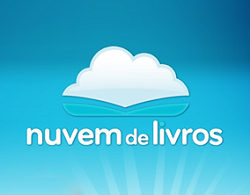 to download, but it is charged, costs U.S. $ 2.00 per month per student and private customers pay about £ 8 per month to get unlimited access to contents
to download, but it is charged, costs U.S. $ 2.00 per month per student and private customers pay about £ 8 per month to get unlimited access to contents
The library now has a collection of 10 000 content for free also on tablets and phones, according to the website terra the service had already won 1 million users in Brazil.
What sounds in Wikipedia?
This was a joke made at the launch of South by Southwest, the media conference in 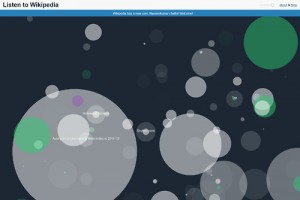 Austin Texas, which actually was the basis of a new open source project to edits audio and animations to Wikipedia.
Austin Texas, which actually was the basis of a new open source project to edits audio and animations to Wikipedia.
Listen to Wikipedia, is the latest transformation of the online encyclopedia for additions and subtractions of sounds, strumming guitars and soothing sounds for you to meditate or listen during a massage or a reading.
.
Pitch changes are possible according to the size of the edition, the visual aspect green circles and white circles indicate editions editions of registered users, and also the size of the overlapping circles indicate how many editions.
The announcement was made at The Verge, and its creators Stephen LaPorte and Mahmoud Hashemi said the about L2W (original name): “There is something comforting in knowing that each user makes a noise, each issue has a voice or a roar” they said.
LaPorte Hashemi and built the Listen to Wikipedia using D3 and HowlerJS and say that was the inspiration Listen to Bitcoin, a digital project done by Maximillian Laumeister, floating in the bubbles of Bitcoin transactions.
The German Libreka and Amazon
Despite having been launched Amazon.de store in April this year in the most prosperous nation in Europe, many leaders of the German publishing industry were already planning to do against powerful German distributor of digital publications, sales of e-books have not taken off there like here in Brazil.
nation in Europe, many leaders of the German publishing industry were already planning to do against powerful German distributor of digital publications, sales of e-books have not taken off there like here in Brazil.
Unlike the American version of sales, the German publishing market still sells printed more than e-books, the German Kindle store, for example, only sells an e-book for every 100 printed books, a growth of only 0.5% of total book sales in the past year.
But the German market digital download is quite strong in terms of music, software and videos, e-books still represent only 5% of the transfers, according to market research firm GfK in Germany.
But one of the problems in Germany, claimed by readers, is the instant access to e-books is not always possible because many digital retailers do not offer a full set of titles in digital format in their catalogs.
The German rival comes Libreka since 2007 competing in this market, and the main platform for the Germans of ebooks, it also has a partnership with German publishers, the MVB (Publishers and Booksellers Association of Germany).
Experience information and colaboration in everyday life
The talk “Collaboration – the most wicked enabler to Research fabulously successful” back interesting findings of Dr. Karen E. Fisher, who is an associate professor at the Information School of the University of Washinton, USA, presented at the 5th. QQML in Rome, Italy.
Their results refer to how people experience information as part of their everyday life, with special emphasis on interpersonal and behavioral aspect, and how information environments or social are “reasons” information within a stream and also when the impact of information technology and communication.
The work of prof. Fischer in the years 2009-2011 went to check the value of public libraries in communities across the United States.
This study used a mixed method (developed with Crandall, Becker, et al.), Which collected data from over 50,000 people through the Institute of Museum and Library Services and the Bill & Melinda Gates Foundation, has as main conclusion that 63% people use people veez technology library for information.
In view of the teacher, this has strong implications for how we design information systems, support information literacy, and determine this impact.
Karen E. Fisher is co-author of Theories of Information Behavior (2005, with S. & L. McKechnie Erdelez), Theory in Motion: Using theories of information behavior to design applications, policy and services (forthcoming, with S. Erdelez) and Digital inclusion: Measuring the Impact of Information and Community Technology (2009, with M. Crandall).
Recém criada DPLA provê vários serviços
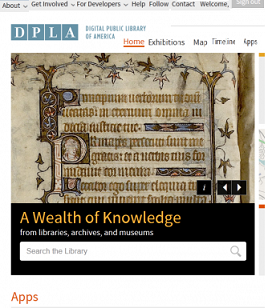 A recém-criada Digital Public Library of America (DPLA) já permite aos usuários navegarempor mais de dois milhões de livros arquivados, imagens, registros e sons.
A recém-criada Digital Public Library of America (DPLA) já permite aos usuários navegarempor mais de dois milhões de livros arquivados, imagens, registros e sons.
Dela participam instituições como a Universidade de Harvard, a Internet Archive, e as bibliotecas públicas de Boston, Chicago e São Francisco bibliotecas públicas, conforme artigo publicado na Ars Technica.
Os serviços já incluem uma interface de programação de aplicativo (API), facilitando o acesso, e está se ligando a bibliotecas regionais e locais para permitir o acesso a jornais locais e arquivos públicos para fazerem pesquisas de famílias, por exemplo.
A pouco tempo atrás, o site da Ars escreveu os desafios da DPLA: “A organização deve ser um banco de documentos, com uma vasta quantidade de metadados, uma advocacia para defesa de pessoas processadas, uma parceria com editoras, uma maneira de não tornar irrelevantes o acesso às biblioteca locais (como livros online, por exemplo), não dando razão se cortarem os financiamentos nestas bibliotecas. E isso vai ser difícil de fazer” afirmava o site.
Apesar de cansado, o diretor-executivo da DPLA Dan Cohen, se disse animado para a Ars afirmando que não tem ilusões sobre as dificuldades a serem enfrentadas.
Ele afirmou a Ars, que organizar os metadados foi a maior tarefa do DPLA a um ano atrás, disse Cohen:. “Os metadados podem ser muito vagos e normalizá-los é uma parte importante por trás de todo este processo …”, concluindo sobre os metadados: “temos um modelo de dados que é bastante rigoroso e muito flexível.”


